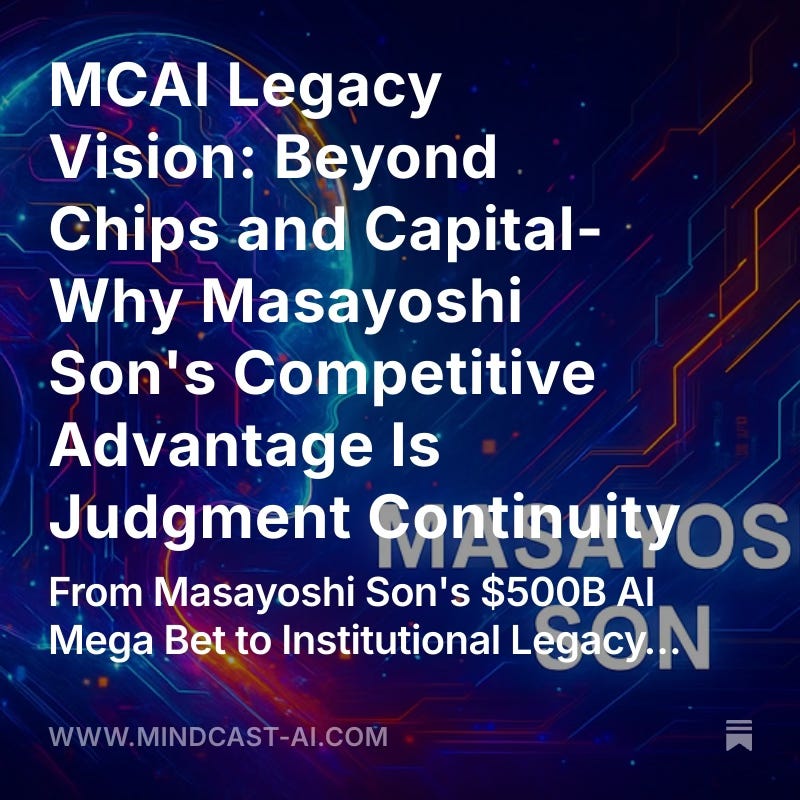MCAI Legacy Vision: Beyond Chips and Capital- Why Masayoshi Son's Competitive Advantage Is Judgment Continuity
From Masayoshi Son's $500B AI Mega Bet to Institutional Legacy Innovation
See companion study MCAI Legacy Vision: Legacy Innovation in Asian Cultures- Designing Continuity, Not Disruption, How Oral Wisdom, Intergenerational Proximity and Mukoyōshi Reframe the Future of Innovation (Aug 2025).
I. Current Event Frame — SoftBank's AI Mega-Bet and the Execution Gap
Masayoshi Son's SoftBank has swung back to profit on the strength of strategic AI bets, notably in Nvidia, TSMC, and a $500 billion Stargate alliance with OpenAI, Oracle, and MGX. This turnaround, reported by SoftBank swings to profit after Masayoshi Son's AI bets pay off (The Japan Times, August 2025), underscores the scale and ambition of Son's AI vision. Yet the same article reveals a slower-than-expected execution pace due to market volatility, trade policy uncertainty, and valuation questions. These delays highlight a deeper challenge: multi-decade projects like Stargate will inevitably outlast their founding leadership, raising the question of how to sustain coherent strategic intent over decades.
SoftBank's trajectory proves that even visionary leadership faces the constraints of time, politics, and market turbulence. The AI boom rewards those who can deploy capital at scale, but will reward even more those who can maintain coherence of purpose across decades.
Insight: Scale alone is insufficient—the competitive advantage shifts from who can build fastest to who can preserve strategic intent longest.
Contact mcai@mindcast-ai.com to partner with us on Cognitive Digital Twins for Legacy Innovation.
II. Historical Precedent — Asian Legacy Innovation and Cognitive Alignment
In many Asian cultures, innovation has traditionally meant the refinement of inherited systems through practice, memory, and care—not replacement for its own sake (Legacy Innovation in Asian Cultures- Designing Continuity, Not Disruption, August 2025). Oral traditions, intergenerational proximity, and moral continuity functioned as resilient "coherence loops," where values and judgment could be corrected, affirmed, and refined in real time. Within this broader system, Japan's mukoyōshi tradition—adopting heirs based on alignment of judgment, not bloodline—stands as a masterclass in adaptive succession.
Companies like Toyota, Suzuki, and Kikkoman maintained stability by prioritizing cognitive and cultural fit over genetic inheritance (From Mukoyōshi to MindCast AI, May 2025). This preserved decision-making DNA, ensuring that leadership transitions reinforced rather than fractured institutional coherence.
Asian legacy innovation demonstrates that alignment of values, proximity across generations, and intentional succession preserve institutional coherence better than conventional methods. For AI mega-projects, these principles are as relevant as they were for centuries-old family enterprises. The question becomes: how do we systematically implement mukoyōshi-style succession in a global, digital context?
Insight: Proven succession methods exist—the innovation lies in encoding them digitally for global scale.
III. Physical vs. Cognitive Infrastructure
Physical infrastructure—data centers, chips, supply chains—forms the backbone of AI deployment. SoftBank's $500B Stargate project represents the pinnacle of this physical build-out. But such systems are brittle without cognitive infrastructure: the encoded decision logic, moral compass, and foresight mechanisms that guide strategy over decades.
MindCast AI's Cognitive Digital Twins (CDTs) extend the principles of Asian legacy innovation into AI governance. CDTs capture why decisions are made, not just what they are, ensuring that projects evolve without losing their strategic compass.
Physical infrastructure can launch AI projects, but cognitive infrastructure sustains them. Without it, even the most ambitious physical systems risk losing coherence when leadership changes.
Insight: The infrastructure gap isn't technological—it's cognitive, creating first-mover advantage for those who solve it.
IV. MCAI's Legacy Innovation Framework
Legacy Innovation converts generational wisdom into a renewable strategic asset through three interconnected components (The Subtle and Enduring Value of Legacy Innovation, July 2025): Memory Architecture encodes institutional decision logic into interactive systems that can be re-engaged by future leaders under new conditions. Foresight Modeling stress-tests these principles against future volatility through probabilistic scenario analysis. Moral Recursion ensures that preserved wisdom evolves ethically and strategically over time through continuous refinement based on outcomes.
Applied to AI mega-projects, this framework acts as a "digital mukoyōshi"—systematically carrying forward the reasoning patterns, relational integrity, and moral priorities that define a founder's vision while enabling adaptive evolution.
MindCast AI's Legacy Innovation bridges founder vision and institutional execution, turning succession from vulnerability into advantage.
Insight: Systematic judgment preservation transforms succession risk into sustainable competitive moat.
V. The Convergence of Interest
This framework addresses a critical reality: all stakeholders in AI mega-projects fundamentally depend on judgment continuity, even when they don't recognize it explicitly. For investors, Legacy Innovation reduces risk by ensuring coherent decision-making survives leadership changes—protecting capital deployed across decades. For AI project leaders, it protects mission integrity while enabling adaptation to changing technological and market conditions. For governments and strategic partners, it ensures alignment with shared policy and strategic goals survives across political and corporate transitions.
All stakeholders in AI mega-projects share an interest in judgment continuity. MindCast AI turns this from aspiration into operational reality.
Insight: Universal stakeholder alignment creates market conditions for judgment continuity as premium service category.
V. Strategic Insight — Judgment Continuity as a Capital Asset
Judgment continuity is an unpriced asset in AI and infrastructure, yet it shapes long-term outcomes more than any other factor. Consider the contrast: while SoftBank's $500B Stargate represents unprecedented capital deployment, the project's ultimate success depends on maintaining strategic coherence across multiple leadership transitions—a capability for which there is currently no market pricing mechanism. Family offices managing multi-generational wealth have long recognized this dynamic: research consistently shows that 70% of wealthy families lose their wealth by the third generation not due to poor investment decisions, but due to breakdown in values transmission and decision-making coherence.
Physical assets depreciate; coherent decision-making compounds in value over time. Treating judgment continuity as capital reframes it from a cultural concern to a strategic necessity.
Insight: Judgment continuity represents the final competitive frontier—where advantage compounds across generations rather than depreciating.



